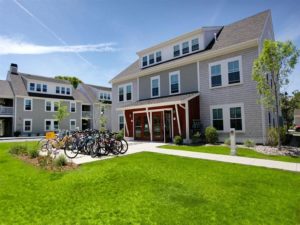Top Story
Kansas City, Missouri – Advisory Service Panel
An Advisory Services panel made recommendations to the Kansas City, Missouri Parks and Recreation Department on the creation of an equitable
August 10, 2020
 Over the past 40 years, Massachusetts communities have continued to “down-zone” and increase regulatory barriers to building housing, especially affordable housing, leading to a statewide housing crisis.
Over the past 40 years, Massachusetts communities have continued to “down-zone” and increase regulatory barriers to building housing, especially affordable housing, leading to a statewide housing crisis.
The Massachusetts Housing Partnership (MHP) was created through an act of legislation in 1985 to increase the overall rate of housing production in the state, by working with towns and cities to demonstrate new and better ways of meeting the state’s need for affordable housing. The state’s Community Technical Assistance (CTA) program helps build municipal capacity and understanding of how local decisions contribute to our regional economies.
The MHP has established a flexible program with four key components: 1) public land disposition for affordable housing; 2) zoning to support affordable housing, including multifamily and inclusionary; 3) building local housing infrastructure (tools and leadership); and 4) community engagement.
For the first component on land, the MHP provides direct and third-party assistance to municipalities, affordable housing developers, and housing authorities to leverage land and other community resources to support the production and preservation of local affordable housing. This includes performing and/or paying for feasibility and site assessments, predevelopment work on sites, writing requests for proposals to identify possible developers for the site, and assisting with the developer designation process.
On the second component, the MHP’s work helps towns and cities explore and write new zoning policies, such as to allow accessory dwelling units or inclusionary zoning. To do this, the MHP provides financial modeling to assess feasibility and impact. To encourage communities to increase density, the MHP looks for ways to leverage other public investments such as transportation.
The third component involves building local capacity to support affordable housing. Two key local tools in Massachusetts are affordable housing trust funds and community preservation committees. The MHP supports the ongoing efforts of both entities to invest in affordable housing and build their boards’ effectiveness.
Finally, the MHP also holds multiple conferences and workshops each year addressing all aspects of creating and preserving affordable housing, geared toward local elected and appointed leaders, municipal staff, housing nonprofit organizations, housing developers, and residents interested in understanding affordable housing better. These engagement efforts are held around the state, offering a regional focus to increase applicability among audiences.
In addition, the MHP has developed a variety of online tools to help communities access the information they need to make effective decisions in creating more affordable housing. From program- and resource-specific guidebooks to the Housing Toolbox for Massachusetts Communities, the MHP provides current and relevant information for all community types.
The MHP’s program is cost-effective because it tailors the support to meet the unique challenges of each community. Allowing for a flexible and simple application process for funding (e.g., letter from a municipality or an organization) ensures that communities and organizations with all levels of resources can access the program. In addition, by not creating deadlines for requesting assistance, we are nimble in responding to needs as they arise.
Some form of Community Technical Assistance (CTA) programming has been part of the foundation of the MHP’s work since the state legislature created the MHP over 30 years ago. The specifics of the programming change to respond to current market conditions. For example, during the housing crisis, we assisted with municipal receivership of foreclosed properties around the state. When the state allowed the creation of municipal affordable housing trusts, the MHP created publications, workshops, and eventually a permanent staff position to support these local efforts.
Over the past decade, the MHP CTA program has created more than 1,000 new units of affordable housing in mostly nonurban, high-opportunity communities; preserved hundreds of affordable units; leveraged over 30 public parcels allocated for affordable or mixed-income housing; worked with 20 communities to make zoning changes that support affordable housing; supported 75 communities in creating and establishing a municipal affordable housing trust fund; and affected close to 300 communities through training sessions and direct assistance.
Don’t have an account? Sign up for a ULI guest account.